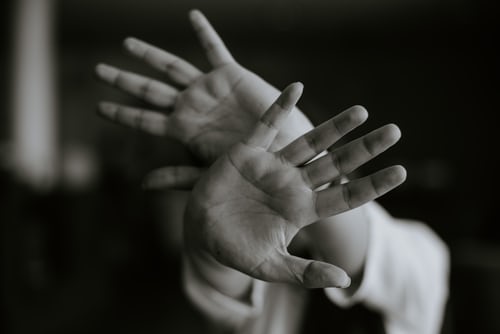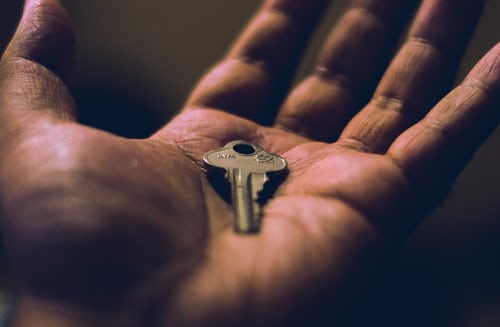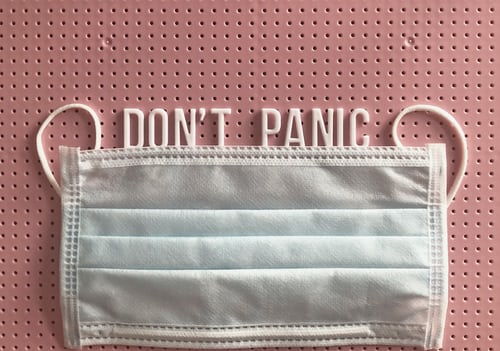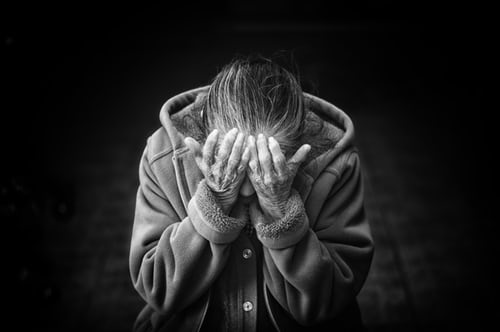Grief. The word alone conjures up a lot of emotion—sadness, fear, pain, numbness, agony, anger. And it may conjure up memories—a loved one’s death, a divorce, or the loss of something significant in life.
Grief. Something all of us at every level of society are experiencing right now, amid strict or loose stay-at-home orders, career losses, thwarted, delayed and unknown futures in this worldwide COVID-19 catastrophe.
Usually grief is felt individually, or in small family and friend units. But now we’re experiencing a collective grief, probably more massive than the grief experienced by a country’s inhabitants during large-scale wars.
Before launching into dealing with the emotions and grief that invariably accompany a catastrophe like this coronavirus, let’s review the definition of grief I presented last week.
Grief is the conflicting feelings caused by a change or an end in a familiar pattern of behavior.

Is what you’re feeling grief?
Based on that definition, would you say you have, have not, or are currently suffering grief during this pandemic?
Has anything in life abruptly changed for you?
Has anything familiar—work pattern, family schedule, travel plans, freedom to come and go as you please—changed for you?
Are you worried about whether, and when, life will ever return to what you used to define as normal?
A myriad of emotions—
The new life we’ve had to adjust to and slog through the last several months, and may have to navigate for some time, dredges up a myriad of emotions.
Anger. Denial. Fear. Sadness. Fatigue. Numbness. Racing heart and thoughts. Fight or flight survival response. Pain. (Emotional pain can and does bring physical pain along with it.)
Emotions come and go all the time, but they’re likely far more frequent, intense and varied now.
As those emotions come, it will help us recognize them for what they are: grief.

Recognizing grief?
Why is it so important to recognize grief?
Because when you can recognize and name grief, you have a better chance of managing it and healing.
And when you can successfully manage it, you can find meaning in it. Meaning behind those uncomfortable—and sometimes frightening—emotions.
David Kessler (who worked with Elisabeth Kubler-Ross on the 5 stages of grief) says that aside from natural disasters or wars, few of us have ever encountered the weight of collective grief. A national grief that bears down on a nation’s conscience, heart and soul.
A grief that presses down until we feel we’re about to crack. That causes our hearts to race and our minds to conjure up possible, horrible events. A grief that triggers anxiety.
Which may explain why so many people are now rebelling against and defying government “orders” to stay at home. Alone. Sometimes isolated and lonely.
The human brain, and its innate desire and need to socialize in tribes, has reached a breaking point for some. They need to do something to remind themselves they’re still alive. That they have a reason for living; to strike a kindling for hope.

Tips for combatting grief-driven anxiety and fear—
Make a list of your life’s tangibles—things you can hang onto that likely won’t change.
Relationships are the first things that usually come to mind, and people seem to be doing a great job of maintaining and deepening them right now. Hopefully that effort will continue once we’re out of the virus woods. It is a positive side effect of this pandemic.
Be tuned in to the emotions that do pass through your conscience, or assault it. And if they’re “negative” emotions, don’t be too inclined to let them settle down in your brain for the duration of this event. It’s when we allow them to nest in our psyches that they overwhelm and control us.
If the emotion is joy, rejoice and nurture it.
If it’s fear, recognize the fear, talk to it if you must, (as I learned to do with the claustrophobia that threatened to stunt my life and rob it of freedom and joy), or draw pictures of it, as you learned how to do in last week’s post. Journal about it in your emotions journal. And definitely learn how to meditate and breathe through it.
Remember to not judge your emotions, or chastise yourself for having them. Just recognize them and learn what you need to do with them.

Avoiding anticipatory grief—
Have you ever experienced anticipatory grief? The kind of grief that creeps up on you and lingers when you anticipate the death of a loved one. That kind of grief can help cushion the fall your heart will take when it happens, prepare your mind and body for the inevitable loss. In many ways, it can protect you from a devastating shock.
But anticipatory grief may be the kind of grief you’re experiencing right now, if you’re looking to the future and all you see is murky fog, an unknown.
When all you care or dare to see is a frightening void.

Since you don’t usually know exactly what your future is going to hold, it’s critical that you don’t get caught up in catastrophic thoughts or what ifs. They can paralyze you, restrain you from doing anything, even if that anything is positive.
It’s so important to keep dreaming and planning; keep hoping, laughing, and loving.
Keep living!


What do you want your post-coronavirus story to look like?
What kind of life story do you want to write?
Whatever it is, I encourage you to start plotting and writing it! Don’t let what’s happening keep you from dreaming, planning, doing.
I know it’s difficult, but we need to keep forging ahead. Not oblivious to realities but in spite of them.
Who wants to look back one, two five years from now and lament how we let this event overwhelm us, control our behavior and thoughts, and stifle our lives and dreams?
As we plan, we know that the plan will come to fruition only if God wills it to be. As we plan, it’s God behind the action, the One who orders our steps.
So as we plan, we commit those hopes and dreams to God—to bless, delay or erase (Proverbs 16:9; James 4:3,15).
Myths about grief—
To get started on grief healing, it’s important to recognize the myths we’re usually taught from a young age. Myths that stifle our emotional health and growth.
Today I’m going to give you 3 of those myths, recognized and taught by the Grief Recovery Institute.
Myth #1: Don’t feel bad.
Have you ever experiencing something traumatic in your life (if it felt traumatic to you, it was), and been told not to feel bad about it?
You felt sad about something and expressed your honest emotion—sadness—to a family member or friend, and their response was that what happened to you wasn’t that important by declaring you shouldn’t feel bad.
What’s wrong with saying that to someone?
For starters, it’s dishonest and dangerous. A feeling is a feeling. And it’s insanely illogical for someone to tell us we shouldn’t feel a certain way.
And the people who do say things like that to us—like moms, dads, friends—often try to anesthetize our feelings with food. And we may try to anesthetize ourselves with alcohol or drugs.
The truth is that you’re going to feel a certain way whether someone else approves or not. And by saying that to someone, you shut down their emotions and cause them to question their feelings and worth.
You’re telling them that their sadness is wrong.
You simply can’t bypass sad, painful or negative emotions, no matter how unnerving or profound.
A good question to ask yourself is: Why is it okay to feel good when something pleasant happens and not okay to feel sad when something painful happens?
As the Grief Recovery Institute experts note:
“If you believe in the magnificent design of humans, then you must accept the fact that in order to have the capacity to feel happiness or joy, you must also be able to experience sadness or pain.”
In their book When Children Grieve, they point out:
“A recent study determined that by the time a child is fifteen years old, he or she has already received more than twenty-three thousand reinforcements that indicate it’s not acceptable to show or communicate about sad feelings” (2001; page 17).
The truth of this statement hits home, in a painful way.
I started my gymnastics career at the tender age of eight and learned immediately that expressions of pain or sadness weren’t allowed. In fact, they were punished.
Stuffing my feelings became the reality and habit of my life for decades. Only recently have I been able to identify my emotions, validate them and understand them as normal.
My emotions make me human and whole. I’m more broken and harmed when I don’t acknowledge them and tell myself I’m weak because I feel them.
I’ve had to go through the difficult grieving process of not being allowed, or able, to feel them.
The book goes on to say that:
“The single largest source of emotional confusion in our society stems from the patently false idea that we somehow should not allow ourselves to experience sad, painful, or negative feelings.”
Feeling bad is not bad. It’s okay for us to feel bad about bad or sad things: Losses. Pain. Dislocations in our lives or routines.
Telling others that feeling bad, or feeling hurt, also feeds into the pervasive and destructive belief that since we shouldn’t feel bad about anything, it must be someone else causing us to feel that way. And then we point blaming fingers at people for making us feel something we believe we shouldn’t be feeling.
When we believe that, we really convince ourselves that we’re helpless.
And the end result is that we don’t take responsibility for what we’ve said, felt, or done.
We become victims—convinced other people are the designers and cause of our feelings.
And we believe that we’re responsible for others’ feelings too.
Myth #2: Replace the Loss
Have you ever felt sad about losing a pet, or a relationship, or an opportunity and had someone say to you: “Oh, that’s okay. We’ll get you a new pet. Or, We’ll go someplace else.
It’s the idea that what you were hoping for or counting on can easily be replaced by option #2, or something else.
That way you’ll instantly stop feeling bad!
Heaven forbid we should feel bad about losing something.
Trying to replace a loss with something else, or thinking that you can, dismisses the importance of the event, the relationship, the milestone, the hard work and dedication given to a goal.
How many thousands of young women and men have missed high school and college graduation ceremonies—significant rights of passage—this year. Passages they’ll never be able to retrieve or recreate or enjoy?
How many couples have missed planned wedding dates, or had to substitute brief court ceremonies for family-festive wedding ceremonies and receptions?
In the United States alone, at least 100,000 families have had to forego honoring memorial services or funerals.
A dangerous effect of this replace-the-loss attitude and practice is:
“A failure to complete past relationships can make full participation in new relationships difficult or impossible.”
Trying to replace a relationship loss can cause a wedge between others.
I think you can see how “Don’t feel bad,” and “You need to replace the loss” often go hand-in-hand.
We can’t fix our sadness and loss through replacement. We need to go through the healing process to complete the grieving.
When your heart has been broken, feel bad about it.
I’m giving you permission.

Myth #3: Grieve alone
Can you finish the following well-known line?
“Laugh and the world laughs with you, cry and you cry…”
Could you finish it?
Insert the word “alone,” and you’re right.
But nothing could—or should be—further from the truth.
But that’s what we’re taught from an early age. That we should let others grieve alone; and that it’s best if we grieve that way too.
Yet Scripture is clear: “Rejoice with those who rejoice; mourn with those who mourn” (Romans 12:15).
Just as we are to celebrate with those who have something to celebrate, we are to grieve with those who have suffered a loss, or are mourning for some reason.
While you may feel as though you want to be left alone (initially) to process the shock of the loss or the information you’ve just received, how many of us grieve alone exclusively because we feel uncomfortable grieving in front of others (heavens, we can’t let them see our weak, weepy side); or feel as though we need to “remain strong” for someone else?
It seems to be a stoic Western trait, as many societies actually invite others to join them in their homes to wail and mourn for a designated period of time. Some actually hire wailers and mourners to follow caskets and funeral processions.
There’s something comforting in knowing that someone else is willing to come alongside you to allow you to grieve, and support you in doing that.
Yes, information and shock overload often cause us to retreat, to be alone and away from others that act as though nothing has changed, or because we’re downright overwhelmed and exhausted. But that doesn’t have to be the norm, and likely shouldn’t be.
The reason most people grieve alone is because they feel guilty about feeling bad and fear being judged or criticized by others for having feelings of loss and sorrow.
We don’t want to feel defective or weak. We’re not sure we should feel bad. And many people are probably telling us this, or implying it.
If you don’t feel safe feeling bad, you’re certainly not going to feel safe feeling bad in public.
Sadly, I frequently see and hear this in the Christian community. In chirpy, pontificating tones, earnest believers cite passage after Scripture passage about counting suffering as joy, or how blessed the mourners and sufferers are and will be in God’s kingdom.
This type of encouragement usually doesn’t encourage. It often adds a heart burden.
The feeling of not being grateful for what I’ve got, I shouldn’t feel bad, and I need to grieve alone.
I encourage everyone to listen to people’s hearts. Weep with them. Hear them. Listen so they’ll talk.
And find others who will listen to your heart, so you can grieve properly, successfully, and complete the grieving so you can arrive at the place of being healed.

Invitation—
How did you do on last week’s invitation to keep an emotions journal? Did you find it helpful? Did you learn anything about the emotions, or number of them that you experienced?
Were you able to reduce your fear and anxiety with the breathing, dancing or shaking exercises?
For today’s post, consider answering the following questions:
- What have you lost, or lost out on because of COVID-19? A job, or business profit? A graduation ceremony? An opportunity you likely won’t have again?
- What kind of emotions are you experiencing because of those losses?
- Have you been able to grieve them, or have you been afraid to grieve? Did you realize the emotions you’ve been experiencing are related to grief?
- Who do you know that you can share your grief with and will listen to your fears and grief and mourn with you? Have you shared with them?
- Think of where you are now and where you’d like to be six, twelve, eighteen months from now? What would you like your life plan to look like? What would you like to achieve?
NEXT WEEK we’ll look at more common grief myths that hinder our healing and grief completion.
Until then, mourn your losses and remind yourself that grief is a natural reaction to them. Find someone to mourn with you. And look forward to the future with hope and dreaming. (Once we complete the grief and emotions discussions, we’ll look more closely at life planning!)
See you back here next week!
Andrea
 Andrea Arthur Owan, M.S., A.T., R., is a fitness pro, chaplain, and award-winning inspirational writer. She works and writes to help people recover from trauma, grief and loss and to live their best lives — physically, emotionally, and spiritually.
Andrea Arthur Owan, M.S., A.T., R., is a fitness pro, chaplain, and award-winning inspirational writer. She works and writes to help people recover from trauma, grief and loss and to live their best lives — physically, emotionally, and spiritually.



Andrea Arthur Owan, M.S., A.T., R., is a fitness pro, award-winning inspirational writer and senior-ordained chaplain. She works and writes to help people recover from trauma, grief and loss and to live their best lives — physically, emotionally, and spiritually.


















